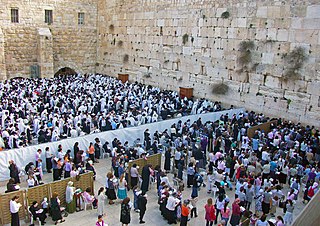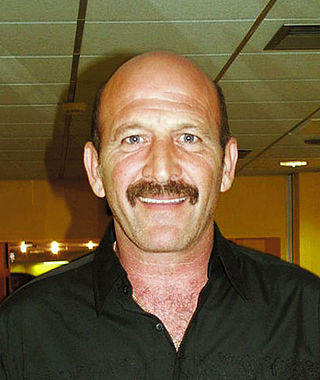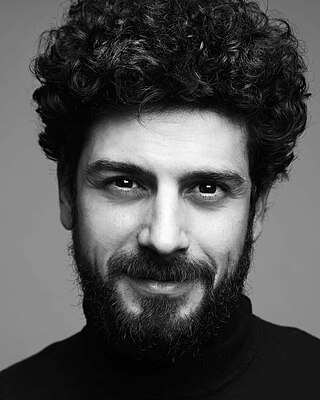
In Judaism, a minyan is the quorum of ten Jewish adults required for certain religious obligations. In more traditional streams of Judaism, only men 13 and older may constitute a minyan; The minimum of 10 Jews needed for a meeting has its origin in Abraham's prayer to God in Genesis 18:23.

A mechitza in Judaism is a partition, particularly one that is used to separate men and women.

Shlomo Riskin is an Orthodox rabbi, and the founding rabbi of Lincoln Square Synagogue on the Upper West Side of New York City, which he led for 20 years; founding chief rabbi of the Israeli settlement of Efrat in the Israeli-occupied West Bank; former dean of Manhattan Day School in New York City; and founder and Chancellor of the Ohr Torah Stone Institutions, a network of high schools, colleges, and graduate Programs in the United States and Israel.
Partnership minyan is a religious Jewish prayer group that seeks to maximize women's participation in services within the confines of Jewish law as understood by Orthodox Judaism. This includes enabling women to lead parts of service, read from the Torah, serve in lay leadership positions, sit in a more gender-balanced format, and in some cases count as part of a minyan ("quorum") of ten men and ten women. Partnership minyanim began in 2002 simultaneously in New York and Jerusalem, and have now spread to over 30 communities in at least five different countries around the world.

The Four Sephardic Synagogues are a complex of four adjoining synagogues located in the Jewish Quarter of the Old City of Jerusalem. The four synagogues include the Eliahu Ha'navi Synagogue, the Yochanan ben Zakai Synagogue, the Istanbuli Synagogue, and the Emtsai Synagogue formed from a courtyard amidst the synagogues that was roofed in the mid-18th century.

The Jewish Museum of Florida-FIU is located in two restored historic buildings that were formerly synagogues, at 301 & 311 Washington Ave., in Miami Beach, Florida. The main museum building, at 301 Washington Ave., was built in 1936, is on the National Register of Historic Places, has Art Deco features, a copper dome, a marble bimah and 80 stained glass windows. The adjacent building located at 311 Washington, which served as Miami Beach's first synagogue, was purchased by the museum in 2005 and restored in 2007 as a museum expansion.

Adas Israel Congregation was a Modern Orthodox Jewish synagogue located in Duluth, Minnesota, established in the late 19th century. Until its destruction by arson on September 9, 2019, it was the oldest surviving Orthodox synagogue in Duluth having outlived and incorporated several Orthodox synagogues in the Twin Ports area. By 1973, it was the only Orthodox synagogue in Duluth.

Nachlaot is a cluster of 23 courtyard neighborhoods in central Jerusalem surrounding the Mahane Yehuda Market. It is known for its narrow, winding lanes, old-style housing, hidden courtyards and many small synagogues.
Igal Naor is an Israeli actor, sometimes credited as Yigal Naor.
Congregation Sherith Israel,, is an Orthodox synagogue located at 3600 West End Avenue, Nashville, Tennessee, in the United States. The congregation is led by Rabbi Saul Strosberg.

Congregation Beth Israel is a Modern Orthodox synagogue located at 4004 West Esplanade Avenue, Metairie, a suburb of New Orleans, Louisiana, in the United States.

Meserich Synagogue, Meserich Shul or Meseritz Shul, also known as Edes Israel Anshei Mesrich, Edath Lei'Isroel Ansche Meseritz or Adas Yisroel Anshe Mezeritz, is an Orthodox Jewish synagogue located at 415 East 6th Street, in the East Village of Manhattan, New York City, New York, in the United States.

The Bukharan Quarter, also HaBukharim Quarter or Bukharim Quarter, is a neighborhood in the center of Jerusalem, Israel. The neighborhood was established by Bukharan Jews of the Old Yishuv. The neighborhood also anchored communities from modern-day Afghanistan and the Iranian city of Meshad. It belonged to the early Jewish neighborhoods built outside the Old City of Jerusalem as part of a process which began in the 1850s. Today most of the residents are Haredi Jews.

This article deals in more detail with some of the notable synagogues of Jerusalem that do not have their own page as yet.
Congregation Shaare Zion is an Orthodox Jewish Sephardic synagogue located at 2030 Ocean Parkway in Brooklyn, New York City, New York, in the United States.
Orthodox Jewish feminism is a movement in Orthodox Judaism which seeks to further the cause of a more egalitarian approach to Jewish practice within the bounds of Jewish Law. The major organizations of this movement is the Jewish Orthodox Feminist Alliance (JOFA) in North America, and Women of the Wall (WOW) and its affiliates in Israel and internationally, known as The International Committee for Women of the Wall (ICWOW). In Israel, the leading Orthodox feminist organization is Kolech, founded by Dr. Chana Kehat. In Australia, there is one Orthodox partnership minyan, Shira Hadasha, in Melbourne.

Amos Lavi was an Israeli stage and film actor. He won three Ophir Awards for the roles he played in the films Sh'Chur, Nashim and Zirkus Palestina.

Zoharei Chama Synagogue, also spelled Zohorei Chama, colloquially known as the Sundial Building or Mahane Yehuda Clock Tower, is a three-story stone building with a wooden attic on Jaffa Road in Jerusalem, Israel, which features a huge, 5-metre (16 ft) diameter sundial on its façade. The building, constructed in stages by Rabbi Shmuel Levy from 1908 to 1917, was built to house a hostel for immigrants and a synagogue. It was damaged by fire in 1941 and partly restored by the Jerusalem municipality in 1980. Today it still houses the Zoharei Chama Orthodox synagogue, which has prayer services throughout the day for local businessmen, residents and tourists.

Avraham Aviv Alush is an Israeli actor, musician, model, and television host. He is best known for playing Amos Dahari "The Baker" in the Israeli series Beauty and the Baker, and as Jesus in the American film The Shack (2017). He also played a leading role in the Israeli series Valley of Tears (2020).
Beit Harambam Congregation is a Sephardi Orthodox Jewish congregation and synagogue, located in Northeast Philadelphia, Pennsylvania, in the united States. Founded in 1978, its membership is largely composed of Hebrew-speaking Israeli expatriates. Started as a basement minyan, the congregation purchased a small home in the 1980s, which was subsequently destroyed by arson in 2000. With significant funding from the Philadelphia Jewish community, the building was restored. The synagogue was further expanded with a larger sanctuary and a social hall, completed in 2011.

















